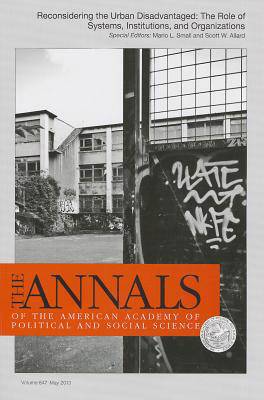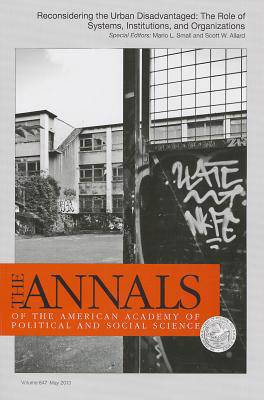
- Afhalen na 1 uur in een winkel met voorraad
- Gratis thuislevering in België
- Ruim aanbod met 7 miljoen producten
- Afhalen na 1 uur in een winkel met voorraad
- Gratis thuislevering in België
- Ruim aanbod met 7 miljoen producten
Reconsidering the Urban Disadvantaged: The Role of Systems, Institutions, and Organizations
Omschrijving
Reconsidering the Urban Disadvantaged: The Role of Systems, Institutions, and Organizations
THE ANNALS of the American Academy of Political and Social Science
May 2013, Volume 647
Special Editors:
Mario L. Small and Scott W. Allard
The recent economic recession and a sluggish recovery have made conditions especially precarious for the most disadvantaged members of the urban poor population--those with criminal records, health condi-tions, undocumented status, or unstable housing. The authors in this volume of The ANNALS argue that the fewer the resources to which people have access, the more their circumstances will depend on the organizations in which they participate, the sys-tems in which these organizations operate, and the institutions governing the behavior of both.
Over the last 25 years, social science on urban poverty has grappled primarily with evidence of deindustrialization and the loss of low-skilled manufacturing jobs. In turn, structural economic change has transformed family structure, educational attainment, crime, and geographic concentration of the poor. Researchers have approached these issues from a limited set of theoretical perspectives, perspectives wherein the core units of analysis, aside from the market, have been the individual and the neighborhood. The editors of this volume argue that, today, understanding the conditions of these highly disadvantaged populations requires a focus on not only individuals and their neighborhoods but also, and perhaps more importantly, on the organizations that structure their lives, the systems in which those organizations are embedded, and the institutions that regulate both.
Paperback: $35.00, Sale Price $28.00, ISBN: 9781483306568
Hardcover: $48.00, Sale Price $38.40, ISBN: 9781483306575
Specificaties
Betrokkenen
- Uitgeverij:
Inhoud
- Aantal bladzijden:
- 299
- Taal:
- Engels
- Reeks:
- Reeksnummer:
- nr. 647
Eigenschappen
- Productcode (EAN):
- 9781483306568
- Verschijningsdatum:
- 8/05/2013
- Uitvoering:
- Paperback
- Formaat:
- Trade paperback (VS)
- Afmetingen:
- 157 mm x 231 mm
- Gewicht:
- 453 g

Alleen bij Standaard Boekhandel
Beoordelingen
We publiceren alleen reviews die voldoen aan de voorwaarden voor reviews. Bekijk onze voorwaarden voor reviews.











